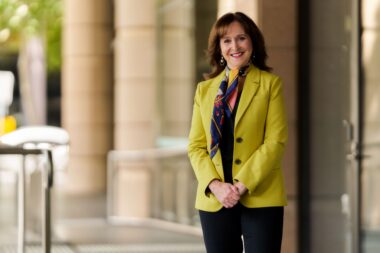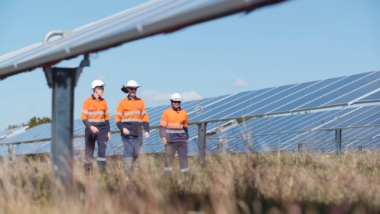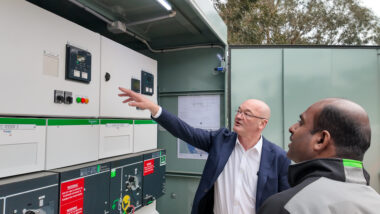AUSTRALIAN experts are responding to fire and smog blanketing New York today, having lived through an eerily similar climate-fuelled disaster - known as Australia’s Black Summer - more than three years ago.
They say this is history repeating and will only continue to happen if global emissions are not urgently slashed this decade.
Greg Mullins, leader of the Emergency Leaders for Climate Action Australia, former Chief of Fire & Rescue NSW and author of Firestorm: Battling Supercharged Natural Disasters said: “This is eerily similar to what capital cities in Australia faced during our Black Summer. It is deeply concerning that Canada is experiencing massive fires this early in their fire season. It doesn’t bode well for what's coming.
“There is no mistaking it: globally, fire is out of control. We have seen fires burning on the outskirts in London, in Greenland, Siberia, across the USA, Australia, Chile and Argentina. The world is burning and it’s because of climate change.
“The reality is we’re going to see more disasters like this. When I think about how similar what New York citizens are experiencing today to what millions of Australians dealt with for weeks in summer 2020/21, it's chilling. Everyone who had fought those Black Summer fires was coughing for 18 months afterwards. People are getting sick, because our planet is sick. If this doesn’t serve as a wake up call, nothing will.”
Jo Dodds, President of Bushfires Survivors for Climate Action, said: “Bushfire survivors in Australia are watching news of these wildfires in Canada, with horror. Knowing what it means to experience these catastrophic fires, we are all hoping people are safe. We know what it means to lose someone, or something precious to such fires. The injustice of ongoing fossil fuel emissions while homes are burning, is very hard to swallow.”
Climate Councillor and Climate Scientist Professor Emeritus David Karoly said: “Climate change is worsening fire weather conditions all over the world. This is exactly what is happening in eastern Canada right now. There has been a period of high temperatures and dry conditions, similar to the lead up to Australia’s worst recorded fire season in 2019 to 2020. Once again we’re seeing the ongoing, worsening impacts of climate change on the conditions that lead to large fires like these. If we don’t take action to urgently reduce global emissions and to stop burning fossil fuels, these fires will become more frequent and more severe.”
Climate Councillor and Public Health Physician Dr Kate Charlesworth said: “With hazardous air pollution, like Australians experienced during Black Summer, Canadians and Americans will be rushing for the face masks and home air filters to try to protect themselves and their families.
“As a doctor, I’m concerned about the immediate health risks and the longer term issues following exposure to smoke from wildfires, like poor obstetric outcomes, impaired lung development in children and mental health impacts.
“There’s no safe level of air pollution. Bushfire smoke contains a range of harmful chemicals and has been likened to tobacco smoke. It has long been associated with heart and lung disease, and it is now linked with preterm births, low birth weight babies, poor lung development and asthma in children, diabetes, stroke and some cancers.
“Canada and the United States are yet to fathom the health cost resulting from these major wildfires. These fires are a symptom of the climate emergency. We’re paying a heavy price – with our health and our lives – for global inaction on the climate crisis.”
Australian Climate Council CEO, Amanda McKenzie said: “The Canadian wildfires and the air pollution spreading across the United States serve as a stark wake-up call, showing the interconnectedness of climate impacts across borders. The magnitude and intensity of these fires mirror the catastrophic infernos that raged across Australia during the Black Summer. Scenes of smog-covered New York City bear a haunting resemblance to the images of Australian cities, towns and landscapes shrouded in smoke.
“Hundreds of Australians died from fires or from the toxic air that covered three of Australia’s major cities for weeks. The fires burnt over 18 million hectares, destroyed more than 3000 homes and killed three billion animals. This shared experience should inspire global cooperation to combat climate change, as we strive to build resilience, prioritise adaptation measures, and transition to a low-carbon economy. Together, we must take bold steps to safeguard our future and ensure the well-being of our communities, both in Australia and around the world.”
Doctors for the Environment Executive Director Dr Kate Wylie said: “As a doctor I can’t help but be deeply concerned about the extensive smoke clouds from the Canadian wildfires on populated areas. These fires and the smoke are reminiscent of the Australian Black Summer of 2019/20 in which bushfire smoke affected 80 per cent of Australians. There were 417 excess deaths because of smoke inhalation, over 2000 excess admissions for respiratory problems, 1100 for cardiovascular problems and an excess of 1300 presentations to emergency departments for asthma.
“Bushfire smoke affects everyone. Exposure to such pollution increases the risk of respiratory diseases, such as asthma and bronchitis, heart disease and lung cancer, particularly in vulnerable groups like older people, pregnant people, infants and children.
“With global temperatures on the rise, we need to urgently and rapidly phase out fossil fuels to protect the public from their disastrous impacts on human health that global warming and climate change cause.”
ENDS
About us:
For interviews please contact George Hyde on 0431 330 919 or [email protected] or Zerene Catacutan on 0438 972 260 or [email protected]
The Climate Council is Australia’s leading community-funded climate change communications organisation. We provide authoritative, expert and evidence-based advice on climate change to journalists, policymakers, and the wider Australian community.
For further information, go to: climatecouncil.org.au
Or follow us on social media: facebook.com/climatecouncil and twitter.com/climatecouncil



